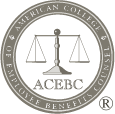Annual Writing Competition
Since 2005, the College has sponsored an annual writing competition for law students, to encourage them to learn about employee benefits. Papers may be on any legal topic in the employee benefits field and may be up to 40 pages (including footnotes). Up to two monetary awards are offered: The Sidney M. Perlstadt Memorial Award, funded by Fellow Susan Serota, and the Brian J. Dougherty Memorial Award, funded by Jaimee Gilmartin. If deemed suitable by the publication, one or more of the winning papers may be published by the following Wolters Kluwer publications edited by Fellow Bruce J. McNeil: the Journal of Pension Planning and Compliance, or the Journal of Deferred Compensation: Nonqualified Plans and Executive Compensation.
The College's writing competition’s award winners are selected each year by the ACEBC® Writing Competition Committee from among eligible submissions. Submissions have been received from a wide variety of law schools from across the nation. If you, or a law student you know, would like to submit a paper for consideration in the law student writing competition, please contact your law school’s career development office (or its similar student development office) for details, or you may contact the Writing Competition Committee at fquick@maynardnexsen.com. Eligible submissions may include papers prepared for other purposes, including for publication in a law journal or other periodical, as long as the College receives any consents necessary to publish or republish the paper. Specific details are available in the Writing Competition Rules.
Each year the eligible submissions are circulated among a group of initial reviewers consisting of ACEBC® Writing Competition Committee members and other ACEBC® Fellows who volunteer to perform that task. Each initial reviewer provides his or her evaluation on the papers based upon the factors identified in the competition rules. Those factors are as follows: (i) Analysis (i.e., depth and creativity of legal analysis); (ii) Research (i.e., thoroughness of legal research); (iii) Writing (i.e., organization/writing style); (iv) Difficulty (i.e., difficulty of subject matter); (v) Policy (i.e., consideration of policy implications); and (vi) Overall impression. The individual evaluations are then used to reach a consensus on the best overall papers from among the eligible submissions.
The final step before the best papers are recommended to the Board of Governors for selection as the winning papers is a rigorous check of the citations contained in these papers. Once the papers clear this cite check, the committee reports its recommendations to the Board of Governors for final approval of the awards. No one involved in the process other than the committee's chair is informed of the identity of the student author of any paper or of the author's law school until the committee completes its deliberations.
The writing competition has been successful in many ways, but one measure is that several of the competitors have gone on to practice employee benefits law after their graduation from law school.
2024 Competition February 1-June 1
Contact Info:
Questions about the Writing Competition should be directed to Frances Quick, Chair of the ACEBC® Writing Competition Committee at fquick@maynardnexsen.com

